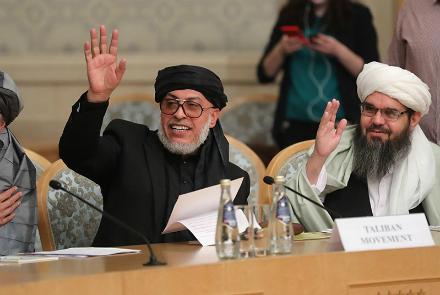A source confirmed to TOLOnews that Mullah Ghani Bradar, Taliban’s number two and the group’s head of the political committee is en route to Doha for talks with the US envoy Zalmay Khalilzad.
Baradar was appointed as head of Taliban’s Qatar office in January.
Baradar is a co-founder of the Taliban movement in Afghanistan. He was Mullah Mohammed Omar, the founding leader of the Taliban’s deputy. Omar’s death was confirmed in October 2016.
Baradar was captured in Pakistan by a team of Pakistan’s intelligence agency, Inter-Services Intelligence (ISI), and US’s Central Intelligence Agency (CIA) officers in February 2010.
According to another source, four other high-ranking Taliban members including Mullah Omar’s brother will also join Mullah Baradar in the meeting.
This comes after there were doubts about the presence of Mullah Baradar and other influential Taliban members in Qatar talks due to UN sanctions on some of them.
However, US Special Representative for Afghanistan Reconciliation Zalmay Khalilzad in a meeting with his Russian counterpart in Turkey this week said they discussed travel barriers to Taliban.
“We will explore options for securing UN travel waivers for Taliban negotiators to participate in peace talks,” he said.
Countdown Begins for Qatar Talks
Amid growing hopes for result-oriented negotiations on the Afghan peace process, the US and Taliban officials are going to attend the fifth round of talks in Qatar on Monday.
The main topics of the talks would be withdrawal of foreign forces from Afghanistan, ensuring that Afghanistan’s territory is not used as a threat against any other country, a comprehensive ceasefire and direct talks between the Afghan government and the Taliban, according to President Ghani’s spokesman Haroon Chakhansuri.
The Afghan government remains optimistic about the results of the talks as a senior official put it on Saturday.
The High Peace Council, which shoulders part of the efforts for ensuring peace in the country, hopes that Taliban representative will attend the Qatar talks from an authoritative position.
“The issue that prevented the previous talks to yield a result on ceasefire and face-to-face talks between government and the Taliban was that they [Taliban] said they lacked the authority [to decide in this regard] but this time we hope that they [Taliban] will appear from an authoritative position as the people are awaiting [for results],” said Sayed Ehsan Taheri, a spokesman for the High Peace Council.
President Ashraf Ghani who addressed a gathering in Nimroz province on Sunday said peace is coming to Afghanistan in the near future.
“Peace is coming, and I assure you for that,” he said.
The Qatar talks will happen almost 20 days after a large group of delegates from mainstream Afghan political parties sat in Moscow with Taliban officials, discussing the peace process. However, the absence of the Afghan government in the talks was a major topic of debate by critics.
Iran’s Ambassador to Kabul, Mohammad Reza Bahrami, who joined Ghani in his trip to Nimroz, said peace in Afghanistan is in favor of the entire region.
“The engagement of anti-government groups and improvement of stability will ensure a better future for Afghanistan and the region,” Bahrami added.
Preserving the past 18 years’ achievements, including women’s rights and press freedom, have been other main topics under discussion by civil society and women’s rights activists over the past few months. As part of these debates, a group of women activists at a gathering in Kabul on Sunday called for a meaningful role for women in the peace process.
“Taliban’s mindset and Afghan women are the two contradicting sides which require talks and negotiations,” said Fawzia Kofi, an MP, who attended the Moscow talks earlier this month.
“A peace with dignity is a peace in which different ethnic groups will be able to see their dignity in it,” said Farkhunda Zahra Naderi, a former MP.
Despite the efforts by government and its international allies on Afghan peace, critics still remain skeptical and concerned about the price which the people of Afghanistan would have to pay for a sustainable peace in the war-weary country.


